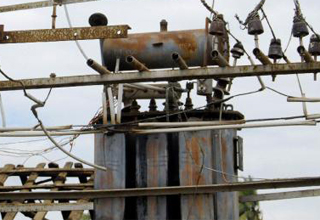No stop to use of second hand steel in transformers
Updated: Oct 19, 2015 03:32:26pm

According to industry sources, the surge in transformer explosions is mainly due to the widespread use of second hand steel in equipment by manufacturers with the motive of profiteering at the cost of quality and durability.
The latest such instance is reported from Rajasthan where five 160 MVA transformers supplied by Maharashtra-based IMP Powers Ltd to Rajasthan Rajya Vidyut Prasaran Nigam Ltd in 2013 at individual price of over Rs 4 crore failed after installation.
It was detected that transformers failed due to technical defects, forcing the utility to send back them for repair to the supplier, according to a senior official in RRVPNL.
“Transformers developed due to technical problems. So we had to send them back to the vendor (IMP Powers) for repair,” the official told KNN. The official, however, could not offhand tell exactly how many IMP Powers transformers failed, though he hinted the number was significant.
Industry sources said IMP Powers has been winning transformer supply orders from utilities because of its mysteriously low bid prices, sparking speculation if it is using junk scrap-grade steel which comes at just half the price.
Even more embarrassing has been RRVPNL’s experience with Hyderabad-based Victory, another transformer supplier, which blamed the utility for failure of its transformers instead of honouring performance guarantee. Not only that, it also resorted to litigation for release of its withheld payment instead of taking its failed transformers back to the workshop for repair.
But the supplier did climb down after the utility authorities put their foot down and threatened to blacklist it. The dispute dragged on for more than a year before the supplier withdrew the case and agreed to do repair transformers without any charge. It also submitted a separate Bank Guarantee.
This trend of transformers conking off due to technical defects has taken on a menacing proportion thanks to the widespread use of inferior-quality steel whose import is happening unhindered despite the official ban.
Industry sources said Bureau of Indian Standard and customs are supposed to check import of sub-standard steel but are not doing their duty.
Low-quality transformers supplied by greedy vendors to UP Power Corporation Ltd have claimed life and caused loss of property in Meerut. In one incident, an UPPCL lineman died on the spot after falling from an electric pole which snapped. The lineman was working as a contract worker. The pole broke in half when he was trying to fasten a wire to it and the rope to which the wire was tied pulled by his team mates on the ground.
In another incident in the same district, steam oil spurting out of an exploded transformer scalded children in a nearby house, causing agony to the family. In yet another incident, two transformers burst into flames sparking panic in the neighbourhood.
Such tragic incidents can be stopped if utilities go for quality transformers with reliable performance guarantee rather than cheap ones which may cost less but would fail after installation due to technical faults.
The apex industry body for MSME associations, FISME, has suggested implementation of measures including 100% computerisation and IT-based management of inventories of material and equipment procured by utilities with doubly entry providing details on both vendors and concerned procurement officials. It has also pushed for putting information in public domain on performance of procured equipment by maintaining records on date of purchase, breakdowns, replacement and make of major electricity equipment such as transformers, turbines and switchgear. FISME has suggested that compliance with the outlined measures should be mandatory for disbursal of central funds provided to state electricity boards under various schemes. (KNN/ NM)












